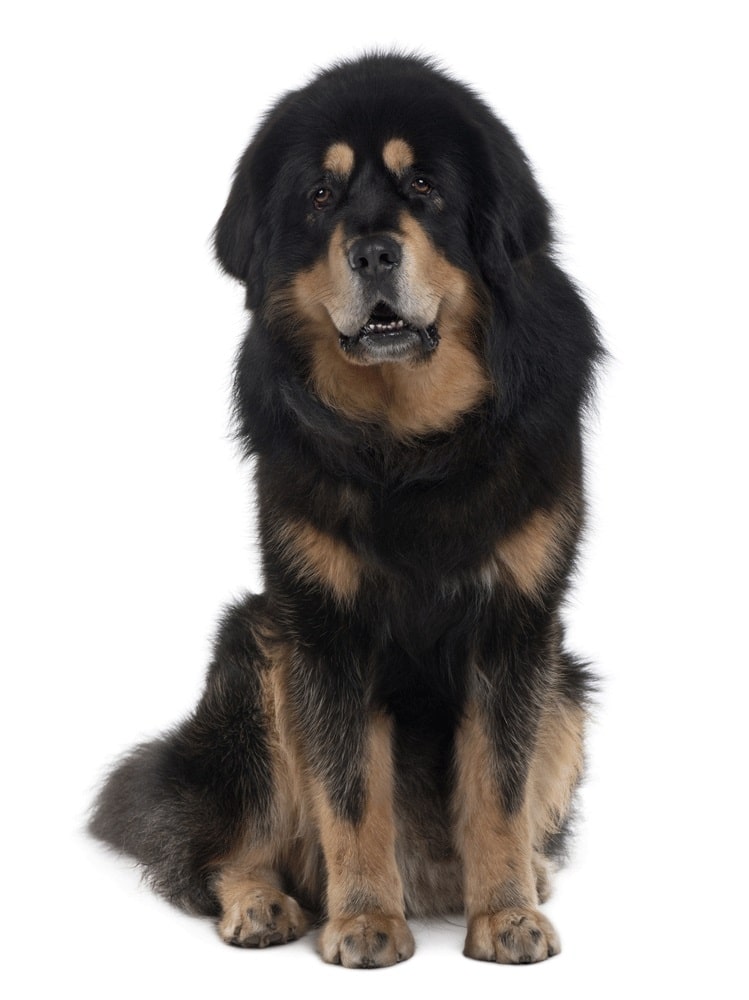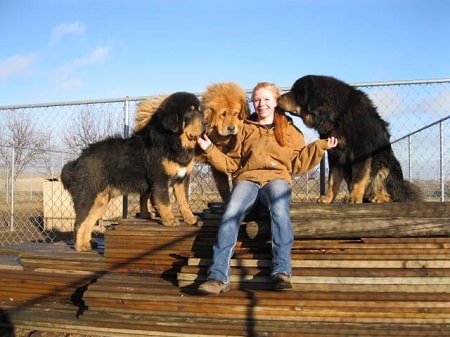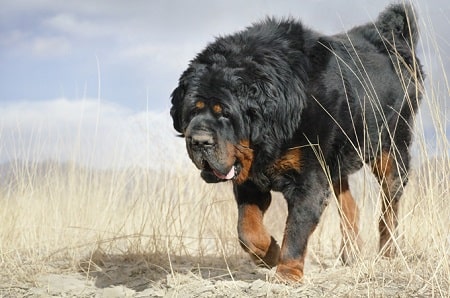Tibetan Mastiff is a large fluffy dog whose expressive brown eyes, a noble, sagacious expression will make you fall in love with him. They’re work driven and take their work of being the protector so seriously. These large dogs are independent but also love being close to their owners.
Tibetan Mastiff Breed Overview

| Group: | Working Group |
| Size: | Extra Large (75-160 pounds) |
| Lifespan: | 10-14 Years |
| Best Suited For: | Families |
| Temperament: | Intelligent, Protective, Stubborn, Strong willed |
| Exercise Needs: | Moderate |
| Drooling Potential: | Low |
| Grooming Needs: | Low |
| Similar Breeds: | Chow Chow, Mountain dog, Himalayan Sheepdog |
1. Basic Features
As the name suggests, the Tibetan Mastiff originated in the nomadic cultures of Tibet, India, China, Mongolia, and Nepal. Local Tibetan tribes used it to protect their sheep from wild animals. They have a strong built, long coat and a beautiful coat.
Tibetan Mastiffs are loving, gentle, and patient. They understand people well. Considered a brilliant guard dog, they are very loyal and protective of their family.
Tibetan Mastiffs are very independent and may not always obey their owner. They can turn stubborn at times and have a mind of their own.
2. Tibetan Mastiff Origin

Tibetan Mastiff is a very ancient breed which originated in Tibet. The breed is said to be very old but does not have plenty of factual evidence. We can’t exactly say when they can into existence. In the early 19th century, Tibetan Mastiffs were introduced and bred in England.
However, during the war, the breed lost its importance and nearly died from England.
The breed had an analogous history in the United States. The late fifties saw two Tibetan Mastiffs being gifted to the President of the US.
People start using these dogs on a farm and they vanished from public scrutiny. It wasn’t until 1970 that many more Tibetan Mastiffs were imported into the US. They had now become the muse dogs of the United States.
After 1980, the breed started getting a recognition worldwide.
3. The Personality of Tibetan Mastiff
Tibetan Mastiffs can be quite stubborn and challenging. They are intelligent and have a strong sense of self. Tibetan Mastiffs demand to be treated equally as they have a high self-regard.
Tibetan Mastiffs are great guard dogs and take their jobs very seriously. They are very protective of their family. They stay alert and active during all times, especially the nights.
While young, these dogs are very aggressive but they turn serious while growing old.
4. Tibetan Mastiff Behavior

Tibetan Mastiffs is a stubborn and dominant breed. However, Early socialization that continues throughout his life will help prevent him from becoming territorially aggressive. It is important to train a Tibetan Mastiff in order to avoid any unpleasant behavior.
Introducing him to new people and taking him to busy parks would help him be normal around a lot of people.
Lack of consistent discipline can result in the creation of unpredictable dogs which can be dangerous in the future.
The protectiveness of Tibetan Mastiffs requires alertness and planning by the owner so as to avoid mishaps when the dog is just acting as a guardian. Therefore, it is recommended that Tibetan Mastiffs be owned by trained owners only.
5. Exercise requirements

Tibetan Mastiffs may seem lazy and wanting to lie down the whole day but they need some exercise. They need a moderate amount of exercise which could include short walks and patrolling.
They are not very keen on playing games or other such activities. Tibetan Mastiffs like work-related activity.
Moving around their yard and a short walk would do the needy. They could also indulge in play with other dogs and enjoy that.
Tibetan Mastiffs are more active in cooler weather and tend to conserve energy when needed.
As puppies, they are much more active and would love playing and running around. However, as an adult, they are less motivated to run around.
6. Diet Needs
Tibetan Mastiffs needs high-quality food twice daily. Being such a large dog, they are prone to bloating. To avoid a bloat, it is important that no physical activity is followed at least an hour after meals.
The amount of food depends on the age, size, and weight of your dog. It is important to note that your dog is in perfect weight. Make sure he isn’t overweight and they alter their diet accordingly.
7. Trainability
It is quite difficult to train a Tibetan Mastiff as it is a very stubborn dog breed. They assume themselves to be their own masters and thus can cause problems.
Training should begin at a very early age with firmness. One should be firm but never too harsh while training.
A Tibetan Mastiff will always follow his instincts over any training.
Also, they may not respond well to treats as a training tool because they are not very food driven. Tibetan Mastiffs are very notorious and should not be trusted off leash.
8. Common Health Problems
Tibetan Mastiffs are generally a healthy breed but may be subjected to a few genetic diseases.
Canine Hip Dysplasia (CHD) is a heritable condition in which the thighbone doesn’t fit snugly into the hip joint. This eventually will cause lameness or arthritis. X-ray screening for hip dysplasia is important in Tibetan Mastiffs. Hip dysplasia is hereditary, however, it is worsened by environmental factors, such as rapid growth from a high-calorie diet or injuries.
Elbow Dysplasia is also common in large dogs like Tibetan Mastiffs. In this condition three bones have different growth rates which are responsible for making a dog’s elbow, causing joint laxity.
Thyroid evaluation should also be conducted to make sure the dog is healthy.
9. Who should Adopt a Tibetan Mastiff
Families with small children should not pet a Tibetan Mastiff. This breed exhibits dominance over anything smaller than he is, and won’t hesitate to boss children around. Toddlers can be at a risk of being bitten.
Tibetan Mastiff needs a socializing lesson at an early age. So that they can be comfortable with other pets growing up around.
Tibetan Mastiffs are very protective and are devoted to their owners but they require someone who can control them. An owner who has some previous experience with dogs is recommended.
Tibetan Mastiffs are great and loving. They make the perfect pets and the best guards.
